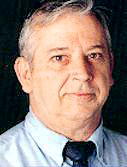Years ago, during a conversation after church, a gentleman made a statement that was not only true but lies at the heart of our dilemma in terms of cleaning up the environment.
"Because of technological advancements, we can now detect chemicals in minute amounts — parts per billion, even parts per trillion," he said. "The trouble is, nobody knows if chemicals in such trace amounts cause a health hazard."
This fellow worked in his state’s environmental department, and the problem he laid out remains with us to this day. Recently, the federal government discovered perchlorate, a chemical used in solid rocket fuel, in various foodstuffs such as lettuce grown in South Florida and California and milk in Maryland.
But does it cause any harm? Nobody really knows. Naturally, if you drank a glass of pure perchlorate, it would probably kill you or make you gravely ill. Toxicity, however, is always a matter of dosage. A common medicine like aspirin will also kill you if you take an excessive amount at one time.
In the case of the milk from Maryland, where the perchlorate was found to be 11.3 parts per billion, you would have to drink 1 billion quarts of milk to consume 11.3 quarts of perchlorate. Nobody is going to consume a billion quarts of milk or a billion pounds of lettuce.
Generally speaking, we live in a closed system, and nothing ever disappears. When something is burned, whether it is rocket fuel or coal or wood, part of it is converted to heat, and the rest becomes byproducts. Trace amounts of mercury are found in a lot of fish, and its source is thought to be from burning coal in power plants. Plenty of stuff continues to come out of the tailpipes of our cars. Our very flesh is made of chemicals.
When we use the word "chemicals," we tend to think in terms of stuff in bottles in a chemistry lab, but in fact the entire universe is composed of chemicals. Only so many elements have been discovered, and from these all compounds are made, including those that make up our own bodies.
We need to bring our understanding of language into the 21st century so that we don’t panic when someone says a certain chemical is found in trace amounts in food. The food itself is composed of chemicals. Because a boy misbehaved and was made to recite the formula for sugar 50 times, I happen to know that sugar is C-12, H-22, O-11. We don’t think when we drop a spoon of sugar into our coffee that we are consuming carbon, hydrogen and oxygen, and that the water itself is hydrogen and oxygen. Both hydrogen and oxygen by themselves are highly explosive, but bound together as water, they are not only stable but necessary to sustain life.
At the table, we say, "Please pass the salt," not "please pass the sodium chloride." That’s another chemical necessary for life, but taken in excessive amounts it will kill us. All of the vitamins necessary to health are chemical compounds.
Radiation is another case where word magic is often substituted for rational thinking. Our planet is radioactive. Every day of our lives we receive minute amounts of radiation.
Unfortunately in our society, politicians, journalists, special-interest groups and trial lawyers add fog, not light, to most discussions. The point is to remember that whether something is toxic or not depends entirely in most cases on the amount, and that a rational person concerns himself with what he knows is harmful and not with what might or might not have any effects at all on human health.
We know, for example, that carbon monoxide kills, so buy yourself a carbon-monoxide detector and drink your milk and eat your lettuce. We should be more concerned with the lethality of what’s on the other end of rockets than with trace amounts of the rocket fuel. The politicians in this world still have at their command weapons of mass destruction far more complex than their own thinking processes. If we ever make ourselves extinct, it will be because of human stupidity, not pollution.
 Charley Reese [send him mail] has been a journalist for 49 years, reporting on everything from sports to politics. From 1969—71, he worked as a campaign staffer for gubernatorial, senatorial and congressional races in several states. He was an editor, assistant to the publisher, and columnist for the Orlando Sentinel from 1971 to 2001. He now writes a syndicated column which is carried on LewRockwell.com. Reese served two years active duty in the U.S. Army as a tank gunner. Write to Charley Reese at P.O. Box 2446, Orlando, FL 32802.
Charley Reese [send him mail] has been a journalist for 49 years, reporting on everything from sports to politics. From 1969—71, he worked as a campaign staffer for gubernatorial, senatorial and congressional races in several states. He was an editor, assistant to the publisher, and columnist for the Orlando Sentinel from 1971 to 2001. He now writes a syndicated column which is carried on LewRockwell.com. Reese served two years active duty in the U.S. Army as a tank gunner. Write to Charley Reese at P.O. Box 2446, Orlando, FL 32802.




